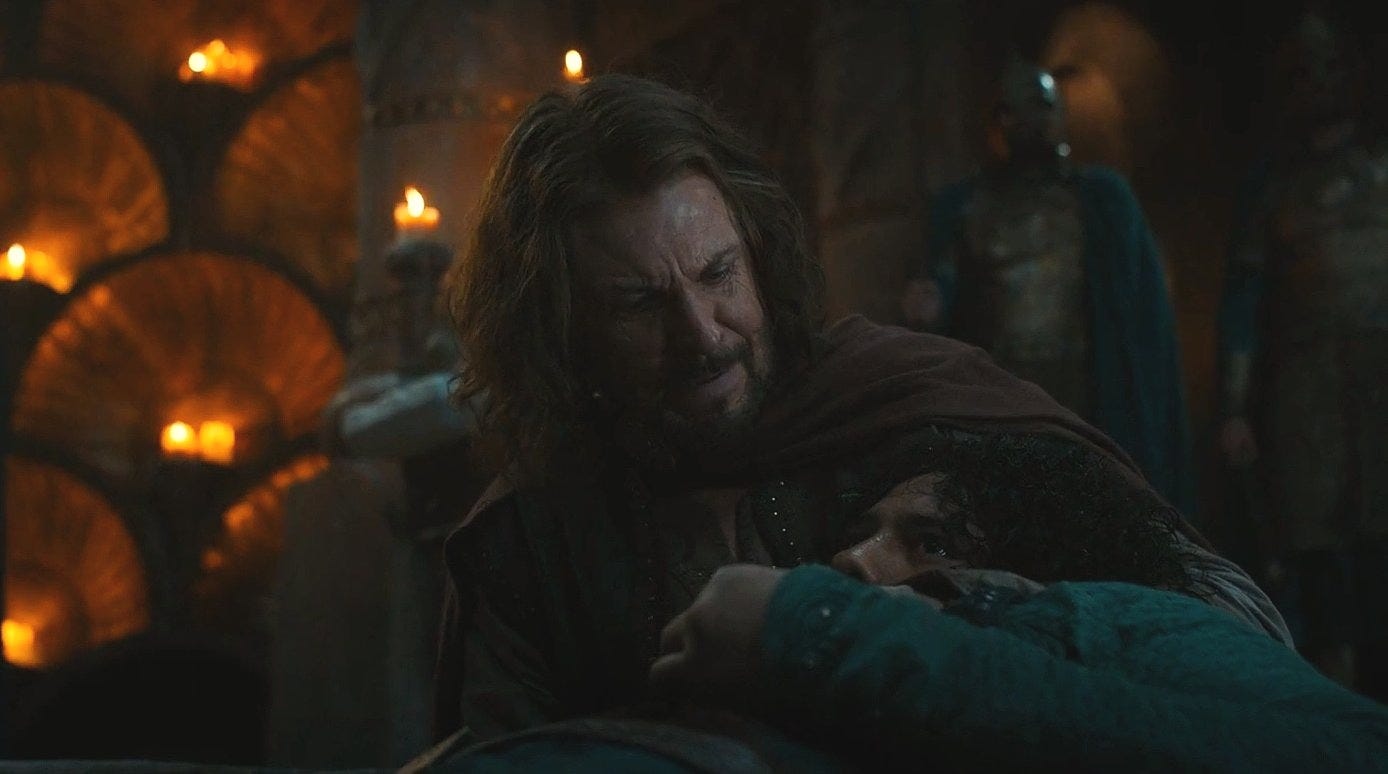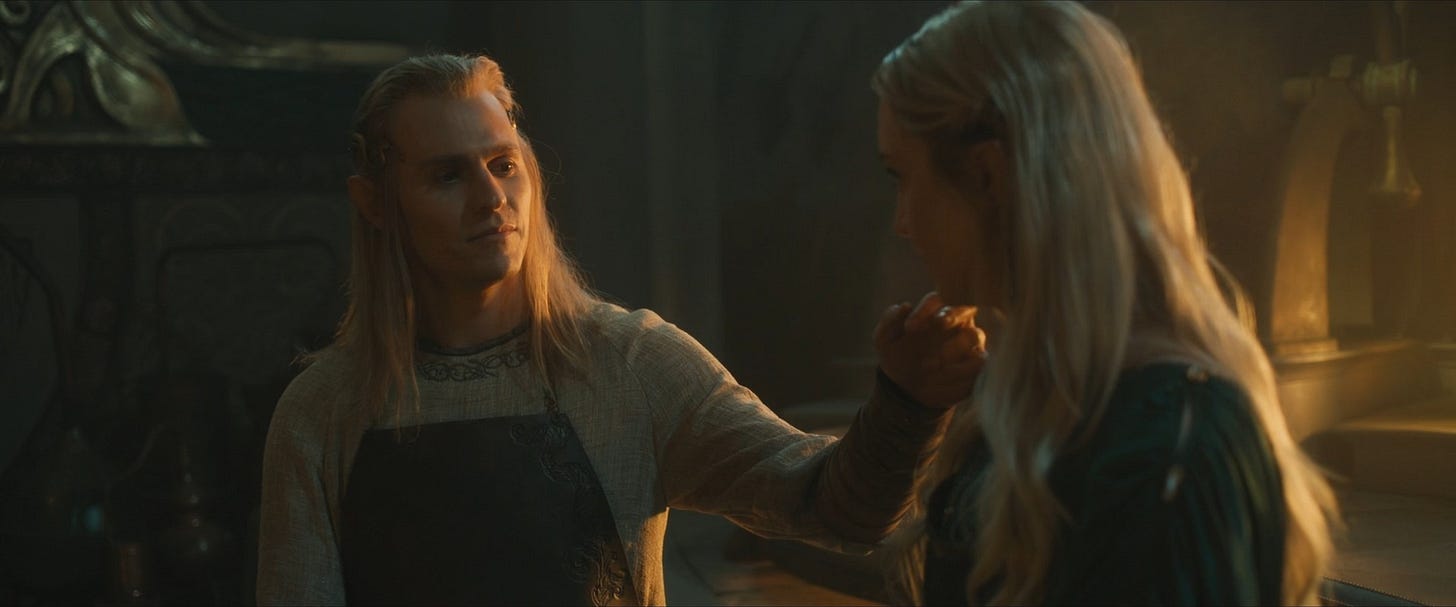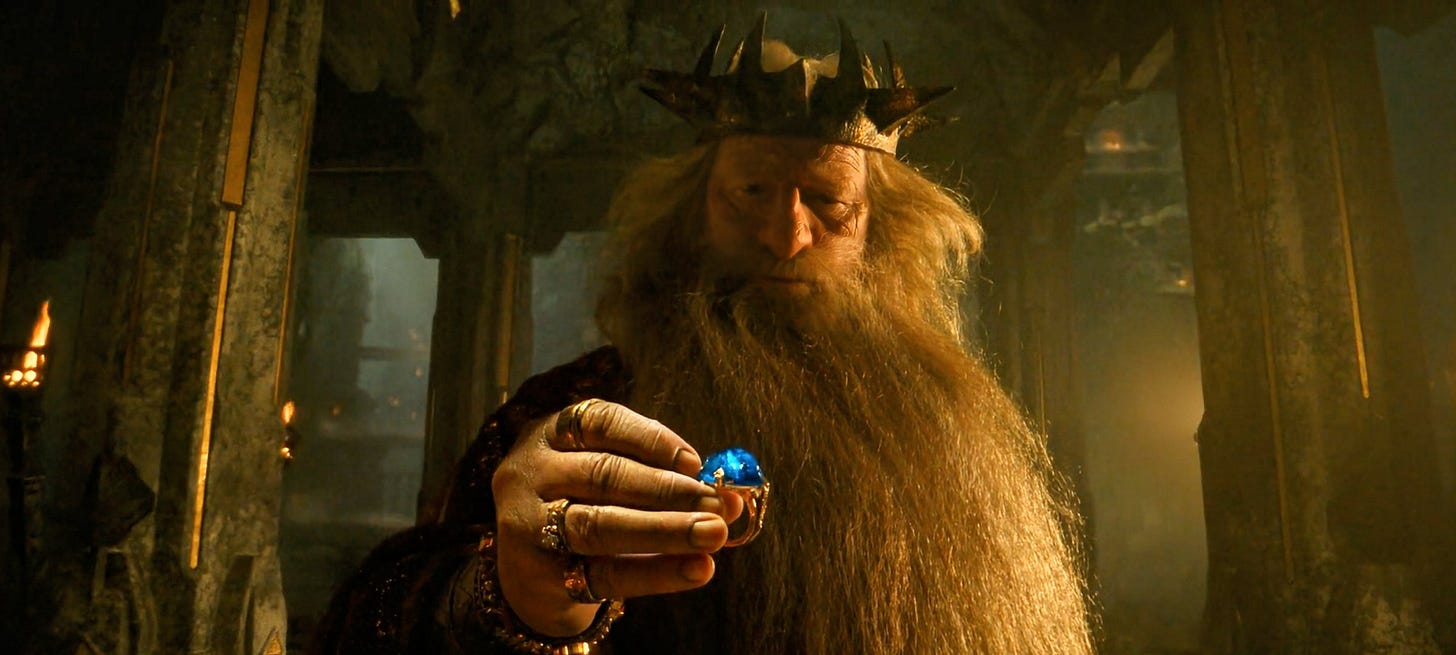The Rogue Prince[s]
Reflections on Episode 5 of Season 2 of The Lord of the Rings: The Rings of Power
Author’s Note: I try to get out my essays on the current Rings of Power episode by Sunday, Monday at the latest. This time, alas, I failed, thanks to a nasty case of ADHD-induced brain block. But at least I didn't fail to produce and publish the essay before the next episode aired, albeit a bit late. I hope you'll forgive me.
One of the biggest complaints about House of the Dragon season 2 is how it badly mishandled Matt Smith’s Prince Daemon, one of Season 1’s most exciting and charismatic characters. In the first season he was active, exciting, funny, and had agency and drive; he fully lived up to his nickname of the “Rogue Prince.” Not so in Season 2, where he spent basically the entire season benched in the haunted castle of Harrenhall, having really weird nightmares and visions that lasted too long and ended up draining him of character and agency and anything fun about him; as best I can tell, it was a drastic overcorrection from showrunners Ryan Condal and Sarah Hess, who were utterly confused by how people would fall in love with him after his transparent toxicity and all their unsubtle attempts to boost Rhaenyra’s (Milly Alcock/Emma D’Arcy) stock.
It’s something of a shame, therefore, that Rings of Power’s second season aired after House of the Dragon’s, because it shows that you can shut up one of your most charismatic characters in a castle and not have it be a total drag. I am speaking, of course, of Sauron (Charlie Vickers) who after his brief stint as Human Halbrand negotiating with Adar (Sam Hazeldine) and stewing in the front gate of Eregion, has spent most of the season in Celebrimbor’s (Charles Edwards) palace as the fair, angelic, blonde Annatar. And he’s having so much fun. He hasn’t lost anything as Annatar, but is instead growing, becoming more powerful, more charismatic, and more terrifying. And he’s still fair and beautiful, he isn’t even terrible and horrifying as he briefly was for one split second of the finale of Season 1. He may not be a prince, but he is without a doubt a true Rogue Prince. And he’s not alone; he’s only the first among equals, as throughout Episode 5 we see various flavors of roguery in the various princes of Eregion, Numenor and Khazad-dum, some more benign than others.
Sauron’s roguery is by no means benign, even as he is the fairest and most beautiful of our subjects. We see him here in all his manipulative, gaslighting glory; this is the first time I've really been sympathetic to the idea that he is some sort of Machiavellian, 4d chessmaster with some sort of master plan, out of which there is no escape. Until now, he’s been far more of an improviser, and although he has his plans, Galadriel (Morfydd Clark) has foiled them at least twice and forced him to start from scratch. But this time, with When Celebrimbor has a grand party to celebrate the renewed alliance between the Elves and the Dwarves, even unveiling an important side project he’s been working on with Narvi (Kevin Eldon)1, Sauron still somehow manages to make the night all about himself and his stated desire to create rings for men; and when Celebrimbor still pushes back, Sauron calmly asserts that he will make Nine Rings himself—and does it, with Celebrimbor powerless to stop him. When Mirdania (Amelia Kenworthy) accidentally stumbles into the Unseen Realm and sees Sauron as he truly is, a being of fire and blood, he quite effortlessly defuses the situation before people start looking askance at him, and later even half-convinces her that she saw Celebrimbor; not only that, how he subsequently flirts with her and compares her hair to Galadriel’s is honestly creepy and a little skin-crawling2. When the Elf-lord learns from Prince Durin that something might be wrong with the Seven Dwarf Rings, Sauron agrees…and pins the blame for it on Celebrimbor, telling him that his lie to Gil-galad via letter3 (a lie that he was responsible for inspiring) is the reason the Seven are flawed, not whatever dark words he himself whispered before throwing the Mithril into the alloy. And when Celebrimbor finally throws up his hands and agrees to oversee the creation of the Nine, Sauron smoothly becomes the Good Cop to the harried and stressed Celebrimbor’s Bad Cop.
Yeah…it’s pretty grim stuff. It was bad enough in the finale of Season 1, when Sauron had only one scene where he was attempting to gaslight and abuse Galadriel into joining him. It’s worse watching him do this to Celebrimbor for almost an entire episode. And we can only watch in horror as Celebrimbor, whose intentions have been good and whose general demeanor has been kind and nerdy, slowly starts to unravel as he starts realizing that something is very wrong with the Lord of Gifts, and that his own pride and ambition in some way brought things to this pass. And all the while, Adar and his host are coming, just as Sauron had hoped, and the episode ends with them practically at the gates; and they have Galadriel herself as a very unwilling, scared, but also confused “guest.” Small comfort to her that Elrond (Robert Aramayo) is finally willing to publicly admit that she was right, or that Gil-galad (Benjamin Walker) is taking a page from her book and heading the counsel not only of his generals, but also of higher powers channeled from his ring. But good intentions alone do not win wars, and Gil-galad, realizing that the Elves are fighting two enemies instead of just one, tells Elrond that they cannot go to war alone.
We can guess from the trailers that Gil-galad probably has in mind the Dwarves, making use of Elrond’s close friendship with Prince Durin the Younger (Owain Arthur). But at this point, it’s an open question whether Khazad-dum will be in any position to help the Elves; it may not even be able to help itself. Just like the Three Elven Rings, King Durin's (Peter Mullen) new ring has done a great deal of good, somehow guiding the king to new areas where the dwarves can dig and open new shafts for the sunlight and thus revitalize their crops and their society. But the Three were merely dangerous; as I mentioned above, the Seven are straight-up tainted and corrupted. Not only is King Durin straight-up demanding tribute of the other six Houses of the Dwarves before he gives their lords the other Six Rings, and a lot of it, his demands upon his own people are becoming even more onerous. The merchants of the bustling market may finally have business thanks to having food to sell, but with higher taxes being imposed from above they have to charge higher prices just to break even. And Durin’s Ring isn’t just telling him where to find shafts for the sunlight, it’s apparently also telling him that there are treasures to be found if only the Dwarves disregard his own restrictions on where and how much to dig. Not only is this quite out of character for a King who disinherited his son for digging for mithril…there’s a real chance that digging too deep will unleash something “ancient and powerful” that Disa (Sophia Nomvete) has discovered is awake deep in the basement. We of course can guess that this is none other than the Balrog teased in the trailers, but Prince Durin has no idea. All he can see is his father rotting from the inside, as mysterious things go bump in the deep places of the kingdom. Officially receiving the collar that reinstates him as the heir (so he is a “rogue prince” no longer) is sooo bittersweet for him. And things will almost certainly get a lot worse.
But for all their problems, the Dwarves are in a much better position to be able to help the Elves than, say, Numenor; after a disappointing debut in Episode 3, the island kingdom actually was a standout as we dealt with the aftermath of the palace coup. Any vestige of an alliance forged by Miriel (Cynthia Addai-Robinson) and Galadriel has, for now, died thanks to our final Rogue Prince, Pharazon (Trystan Gravelle), who has actually done what Daemon was considering4 and seized the throne and sceptre of Numenor. He should be happy as a clam, what with being the king of the greatest realm of men in the world by popular acclaim and with Miriel being surprisingly resigned to being an exile in a tower, like her father. But all is not well, either within Pharazon or within his kingdom. He may be king now, but it will only last as long as he is alive, and actually having the power of the throne only impresses this fact upon him even more; it’s as if he takes the immortality of the Elves, denied to Men, as some sort of personal insult. Meanwhile, his son Kemen (Leon Waldham), desperate to win his father’s approval and whatever benefits may follow, is going rogue himself, but with official sanction from the throne, a squad of soldiers at his back, and the full collaboration of Elendil’s (Lloyd Owen) last surviving child Earien (Ema Horvath), whose ambition and grief for Isildur have mingled into a toxic blend that darkens her heart even as it visibly ages her.

With Miriel having explicitly ruled out taking up arms on her behalf, Elendil and Valandil (Alex Tarrant) are still able to chart a path of nonviolent resistence; the Sea Guard endures mass resignations as Miriel’s loyalists hang up their uniforms, Elendil gives up the longsword that he had received as a mark of his promotion in Season 1, and the Faithful take refuge in the ancient ways, revering the Valar and praying for the souls of those they’ve lost. But it’s a quality of all petty tyrants, actual and aspiring, that they need things to be done absolutely their way, and Kemen is no exception. This leads to one of the most heartbreaking scenes we have ever seen in a Tolkien adaptation, ripped straight from the Akallabeth, Shakespeare, the Persecutions of the Early Church, and the Iconoclast Controversy. The Faithful, led by Elendil, Valandil, and William Chubb’s “ordained acolyte” are quietly having an unobtrusive ceremony at a shrine dedicated to Nienna, the Vala of pity and sorrow, when Kemen and his goons arrive to clear the property preparatory to demolishing the shrine. Things escalate; the shrine is defiled in more ways than one; Valandil shows that the only way a dweeb can take down a warrior is by treacherously stabbing him in the back; Elendil loses essentially yet another son; and Kemen becomes, with one thrust, the most hated character in fantasy television since Sir Criston Cole, maybe even since Joffrey or Ramsay Bolton. The will of Sauron is at work among the heirs of the Edain; we can even hear subtle echoes of Sauron’s theme as Pharazon considers looking into the Palantir for himself. And as we know from the Akallabeth, things are going to get a LOT worse. For now, the Elves and the Dwarves will have to face Sauron and Adar alone.
While last week was the actual mid-point of this season, this episode felt more like the mid-point than E4 did. And in a more perfect world where we had 10 episodes to a season instead of 8, it would have been. As it stands now, we only have three more episodes to go, and all indications are that they will focus on the Siege of Eregion. It’s honestly a bit sad; it really feels that we were just getting started (I “blame” the three-episode premiere). And I’m a little concerned. All the trailers have promised a focus on the Siege, and we can be fairly certain that with Charlotte Brandstrom directing the final two episodes, those two for sure will be focussed on the siege. So…what happens to all the other storylines? Durin’s Bane needs to appear and earn his name, probably at the expense of Durin III; Miriel still needs to undergo a trial by ordeal; Tom Bombadil needs to put on his hat and help the Stranger assume his destiny; and are the Harfoots just going to be deferred to next season, or will we at least see Poppy’s crush on Merimac progress to the next stage? And even as the battle rages between Adar and the Elves of Eregion and Lindon, Sauron needs to complete the final destruction of Celebrimbor and have one more showdown with Galadriel. Will the show be able to finish everything strong and do justice to all its storylines with only three episodes left? I have…concerns; part of the reason Numenor shone so brightly this episode was because of how badly it got screwed over in Episode 3. But as Galadriel once said “What cannot be known hollows the mind; fill it not with guesswork.” I suppose the best thing we can do is have faith and just wait and see.

All images ©2024, Amazon Studios, unless otherwise indicated.
For Further Reference
Felicia Day, “Inside the Rings of Power: S2, E5”
Nerd of the Rings, “Rings of Power Season 2, Episode 5 Breakdown”
Daniel Stride, “Is This a Dagger I See Before Me? A Review and Analysis of The Rings of Power Season 2, Episode 5”
Tea with Tolkien, “Episode 5: The Rings of Power Season 2 Breakdown and Reaction”
Thank you for reading The Tales That Really Matter. Please feel free to check out our Facebook, Instagram, Threads and Substack Notes profiles as well, that way we can continue to grow and reach more minds and hearts 😊
None other than the famous Doors of Durin, which will eventually form the West-Gate of Khazad-dum. They were teased in Episode 2 when Celebrimbor is seen creating ithildin, special letters that can only been seen in the moonlight and which would be used to decorate the Doors; now we see the Doors themselves.
Although that scene did do one good thing; it breathed new life into the theory that “Mirdania” is actually Celebrian, Galadriel’s daughter, in disguise. It’s a somewhat convoluted one, but it could work, and is the easiest explanation for why Mirdania looks like a mini-Galadriel even before Sauron alluded to her hair, which was Galadriel’s most striking feature.
This is a strong argument in favor of Galadriel’s thesis that the Barrow-wights were awoken by Sauron, specifically to cut off Eregion from the outside world. After all, while Celebrimbor’s letter assuring Gil-galad that all is well in Eregion got through to Lindon, Gil-galad’s letter warning of Halbrand’s true identity was intercepted by the wights.
Twice, actually. This is another huge complaint that many people had with Daemon in Season 2, how his arc essentially was a repeat of the exact same arc he was on in Season 1, and ended in exactly the same way. Only in Season 2 there were a lot more weird acid trips.







